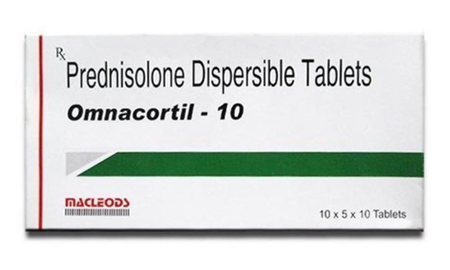Buy Prednisone (Prednisolone) online at lowes Price

| Product Name: | Prednisone (Prednisolone) |
|---|---|
| Doses: | 5 mg, 10 mg, 20 mg |
| Prices: | $0.42 – Per Pill |
| Where To Buy Online | OnlinePharmacy |
|
Prednisone (Prednisolone), commonly known as its brand name, Prelone, is a prescription medication that belongs to a class of drugs known as corticosteroids. It's a synthetic version of a naturally occurring hormone produced by the adrenal glands. Corticosteroids are powerful anti-inflammatory agents that can help reduce swelling and pain. As with all medications, it's essential to understand how Prednisone works, its uses, potential side effects, and precautions before beginning treatment. As a steroid, it's crucial to use Prednisone under the guidance of a healthcare professional. It's worth noting that while Prednisone is used to treat various conditions, it's not suitable for everyone. An individual's medical history, other medications, and specific health concerns can all impact whether Prednisone is a suitable treatment option. What is Prednisone (Prednisolone) used for? Prednisone can be prescribed for a variety of conditions due to its anti-inflammatory and immunosuppressive properties. Here are some conditions for which Prednisone might be prescribed:
Additionally, it can be used in the treatment of certain types of cancers, blood disorders, eye conditions, and as a part of organ transplant protocols to prevent organ rejection. Always remember that the use of Prednisone should be based on a doctor's recommendation and assessment of the individual's health profile. What is the difference between Prednisone and Prednisolone? Prednisone and Prednisolone are both corticosteroids used to treat inflammatory and immune-related conditions, but they differ slightly in their pharmacological properties and mechanisms of action within the body. 1. Conversion in the Body: Prednisone is an inactive prodrug that must be converted to its active form, Prednisolone, by the liver. This means that Prednisone relies on liver enzymes to become effective, while Prednisolone is already in its active state and can act directly. 2. Liver Function Considerations: Patients with impaired liver function may have difficulty converting Prednisone to Prednisolone, making Prednisolone the preferred choice in such cases. Prednisolone bypasses the need for metabolic activation, ensuring more predictable effects. 3. Bioavailability: Prednisolone generally has slightly better bioavailability because it is already active, leading to faster onset in some patients. However, the clinical differences in efficacy are minimal for most people. 4. Therapeutic Use: Both medications are used to treat similar conditions, including autoimmune diseases, allergies, asthma, and arthritis. The choice between them often depends on the patient’s liver health or specific clinical scenarios. 5. Administration Forms: Prednisolone is more commonly available in liquid formulations, making it more suitable for children or individuals who have difficulty swallowing pills. Prednisone is predominantly available in tablet form. 6. Side Effects and Potency: The side effect profiles of Prednisone and Prednisolone are very similar, including risks of weight gain, fluid retention, high blood pressure, and osteoporosis with prolonged use. Both drugs have similar potencies and dosages. The primary difference is that Prednisone requires liver activation to become effective, while Prednisolone is already active. This distinction can influence the choice of medication in certain medical situations. In what forms Prednisone (Prednisolone) is available? Prednisone is available in various formulations to cater to different therapeutic needs and to facilitate administration in different conditions. Here are some common forms in which Prednisone is available and why:
The form of Prednisone prescribed usually depends on the condition being treated, the patient's age, and the desired onset and duration of the therapeutic effect. Each form has its specific indications and might be chosen to target a particular problem area, to avoid systemic side effects, or to provide rapid relief. How does Prednisone (Prednisolone) work? Prednisone mirrors the action of naturally occurring hormones produced in the adrenal cortex, namely cortisol or hydrocortisone. These hormones play a pivotal role in a wide range of physiological processes, including the immune response and inflammation regulation. Prednisone exerts its effects by binding to specific corticosteroid receptors inside cells. Once bound, this complex can influence the expression of various genes, which can either upregulate or downregulate the synthesis of specific proteins. Anti-inflammatory Effects: One of the primary therapeutic benefits of Prednisone is its powerful anti-inflammatory properties. Inflammation is the body's response to injury or infection, often marked by redness, warmth, swelling, and pain. While inflammation is essential for healing, chronic or excessive inflammation can be detrimental. Prednisone acts by inhibiting the function of various cells and chemicals involved in the inflammatory process. For instance, it prevents the accumulation of inflammatory cells at the site of injury, suppresses the expansion of blood vessels, and blocks the release of pro-inflammatory cytokines and mediators. As a result, inflammation is reduced. Immunosuppressive Action: Apart from its anti-inflammatory action, Prednisone has potent immunosuppressive capabilities. The immune system's primary role is to defend the body against pathogens and foreign invaders. However, in certain conditions, the immune system may mistakenly target the body's own cells, leading to autoimmune diseases. Prednisone modulates the immune response by suppressing the proliferation of immune cells, like lymphocytes, and interfering with the function of immune mediators. This suppression makes Prednisone valuable in treating autoimmune disorders and preventing organ transplant rejection, but it also means that patients on the drug may be more susceptible to infections. Does prednisolone differ from prednisone? The primary distinction between prednisone and prednisolone is that prednisone is a prodrug, which means it is inactive in its initial form. When taken, prednisone is converted by the liver into its active form, prednisolone. Once converted, prednisolone can exert its anti-inflammatory and immunosuppressive effects. In contrast, prednisolone is already in its active form when administered and doesn't require conversion by the liver. This difference has practical implications: Liver Function: For individuals with liver impairment, converting prednisone to prednisolone may be inefficient. In such cases, prednisolone might be prescribed directly, as it doesn't require this metabolic conversion. How to Use Prednisone (Prednisolone)? Using Prednisone correctly is crucial for its effectiveness and to reduce the risk of side effects. Here are general guidelines: Oral Administration: If you're taking Prednisone tablets or oral solution, consume them with food or after meals to reduce the risk of stomach upset. Swallow tablets whole without crushing or breaking them. For the liquid form, use the provided measuring device to ensure an accurate dose. Topical Forms: When using creams or ointments, apply a thin layer to the affected area as directed, avoiding the eyes, mouth, and open wounds. Wash your hands thoroughly after application unless your hands are the treated area. Eye and Ear Drops: For eye drops, tilt your head back, pull down your lower eyelid to create a pocket, and administer the drop. Close your eye and press gently on the inner corner to prevent the liquid from draining into the tear duct. For ear drops, tilt your head or lie down, pulling the earlobe up and back for adults (or down and back for children) to straighten the ear canal. After administering, stay in this position for a few minutes to allow the medication to penetrate. Injections: Prednisone injections should only be given by a trained healthcare professional. The mode of injection (intramuscular, intra-articular, etc.) will depend on the condition being treated. Missed Dose: If you miss a dose, take it as soon as you remember. If it's close to your next dose, skip the missed dose and resume your regular schedule. Do not double the dose to catch up. What are the possible side effects of Prednisone (Prednisolone)? Like all medications, Prednisone can cause side effects. While not everyone will experience these, it's essential to be informed. Common side effects include:
There are also more severe side effects, which, although less common, require immediate medical attention. These include severe allergic reactions, irregular heartbeats, mood changes, blurry vision, and unusual weight gain. Always notify a healthcare professional if any unusual or severe symptoms arise while taking Prednisone. What should I be careful of when taking Prednisone (Prednisolone)? When taking Prednisone, there are several precautions to consider. Here are some critical points:
Additionally, be aware that long-term use can lead to osteoporosis or bone loss. Regular bone density tests and preventive measures, like taking calcium and vitamin D supplements, may be recommended by healthcare professionals. Always prioritize communication with healthcare professionals while on Prednisone to ensure safe and effective treatment. How can Prednisone (Prednisolone) improve quality of life? Prednisone, as a potent corticosteroid, offers numerous therapeutic benefits that can significantly improve the quality of life for patients with a variety of conditions. Here are some of the main benefits of Prednisone that contribute to an enhanced quality of life:
|

